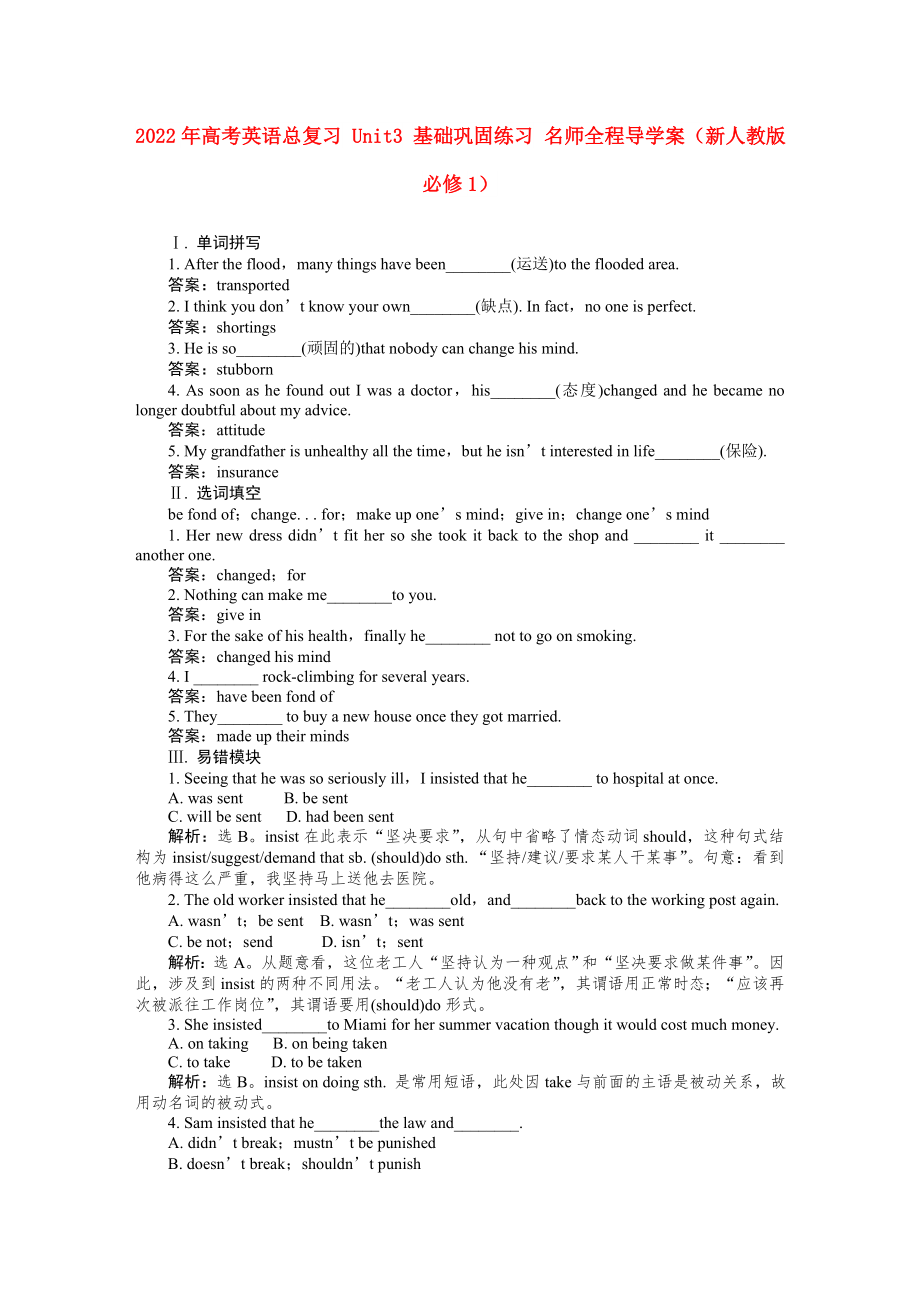《2022年高考英語總復(fù)習(xí) Unit3 基礎(chǔ)鞏固練習(xí) 名師全程導(dǎo)學(xué)案(新人教版必修1)》由會員分享�����,可在線閱讀��,更多相關(guān)《2022年高考英語總復(fù)習(xí) Unit3 基礎(chǔ)鞏固練習(xí) 名師全程導(dǎo)學(xué)案(新人教版必修1)(2頁珍藏版)》請?jiān)谘b配圖網(wǎng)上搜索����。
1、2022年高考英語總復(fù)習(xí) Unit3 基礎(chǔ)鞏固練習(xí) 名師全程導(dǎo)學(xué)案(新人教版必修1)
Ⅰ. 單詞拼寫
1. After the flood�����,many things have been________(運(yùn)送)to the flooded area.
答案:transported
2. I think you don’t know your own________(缺點(diǎn)). In fact��,no one is perfect.
答案:shortings
3. He is so________(頑固的)that nobody can change his mind.
答案:s
2�、tubborn
4. As soon as he found out I was a doctor,his________(態(tài)度)changed and he became no longer doubtful about my advice.
答案:attitude
5. My grandfather is unhealthy all the time����,but he isn’t interested in life________(保險).
答案:insurance
Ⅱ. 選詞填空
be fond of;change. . . for�;make up one’s mind�����;g
3��、ive in�����;change one’s mind
1. Her new dress didn’t fit her so she took it back to the shop and ________ it ________ another one.
答案:changed�;for
2. Nothing can make me________to you.
答案:give in
3. For the sake of his health��,finally he________ not to go on smoking.
答案:changed his mind
4. I __
4�����、______ rock-climbing for several years.
答案:have been fond of
5. They________ to buy a new house once they got married.
答案:made up their minds
Ⅲ. 易錯模塊
1. Seeing that he was so seriously ill���,I insisted that he________ to hospital at once.
A. was sent B. be sent
C. will be sent D. had b
5、een sent
解析:選B����。insist在此表示“堅(jiān)決要求”,從句中省略了情態(tài)動詞should���,這種句式結(jié)構(gòu)為insist/suggest/demand that sb. (should)do sth. “堅(jiān)持/建議/要求某人干某事”�����。句意:看到他病得這么嚴(yán)重�����,我堅(jiān)持馬上送他去醫(yī)院�����。
2. The old worker insisted that he________old��,and________back to the working post again.
A. wasn’t�;be sent B. wasn’t;was sent
C. be not�����;send D. i
6�����、sn’t���;sent
解析:選A�。從題意看,這位老工人“堅(jiān)持認(rèn)為一種觀點(diǎn)”和“堅(jiān)決要求做某件事”�����。因此�,涉及到insist的兩種不同用法?���!袄瞎と苏J(rèn)為他沒有老”,其謂語用正常時態(tài)����;“應(yīng)該再次被派往工作崗位”,其謂語要用(should)do形式��。
3. She insisted________to Miami for her summer vacation though it would cost much money.
A. on taking B. on being taken
C. to take D. to be taken
解析:選B�。insist on doin
7�、g sth. 是常用短語,此處因take與前面的主語是被動關(guān)系���,故用動名詞的被動式���。
4. Sam insisted that he________the law and________.
A. didn’t break�����;mustn’t be punished
B. doesn’t break���;shouldn’t punish
C. hadn’t broken;be not punished
D. hadn’t broken����;not be punished
解析:選D。句意:薩姆堅(jiān)持說他沒有犯法��,不應(yīng)當(dāng)受到懲罰���?����!皼]有犯法”發(fā)生在insisted之前���,所以不用虛擬語氣;“不要受到
8���、懲罰”發(fā)生在insisted之后��,要用虛擬語氣��。
5. No matter what you say����,I shall________my opinion.
A. carry out B. insist on
C. keep up D. stick to
解析:選D。短語動詞辨析�����。句意:不論你說什么�,我都要堅(jiān)持我的意見。carry out 完成���,實(shí)現(xiàn)����,執(zhí)行�����;insist on多用于堅(jiān)持主張��、看法���、意見或要求����,后接動名詞��;keep up保持����,維持;stick to表示堅(jiān)持原則����、決定、諾言�����、理論或理想等�����。
Ⅳ. 語法專練
本單元語法——現(xiàn)在進(jìn)行時
1. (xx年云南師大附中月考
9、)Since I won the big prize�����,my telephone hasn’t stopped ringing. People________to ask how I am going to spend the money.
A. are phoning B. phone
C. will phone D. had phoned
解析:選A���?��?疾闀r態(tài)。此處表示的是當(dāng)前一段時期內(nèi)正在發(fā)生的事情��,所以用現(xiàn)在進(jìn)行時�,即人們現(xiàn)階段一直在打電話詢問“我”贏得大獎后如何花掉那筆錢。
2. (xx年安徽師大附中第一次摸底考試)—Are you still very busy?
10����、—Yes,I________the report for the manager and it won’t take long.
A. have just finished B. am just finishing
C. had just finished D. am just going to finish
解析:選B����。根據(jù)對話內(nèi)容可知,本題用現(xiàn)在進(jìn)行時表示此時此刻的情況�����,即正在寫報(bào)告。其他選項(xiàng)不合語意�。
3. (xx年石家莊檢測)The traffic in our city is already good and it________even better.
A. is
11���、 getting B. has got
C. gets D. got
解析:選A��??疾闀r態(tài)���。句意:我市的交通狀況已經(jīng)很好�,并且它正變得更好�����。此處指目前正在發(fā)生的情況�,應(yīng)用現(xiàn)在進(jìn)行時。
4. (xx年東城第一學(xué)期檢測)—Have you got any jobs yet?
—Well��,I have got several offers����,but not so suitable. I________still________.
A. have been;waiting B. would����;wait
C. am�;waiting D. have����;waited
12、解析:選C��??疾闀r態(tài)。依據(jù)上下文的語境“——你找到工作了么�����?——哦�,我得到了幾個工作機(jī)會,但都不合適�����。我還在等����。”可知�,該處表示現(xiàn)在還在等��,所以用現(xiàn)在進(jìn)行時�����。而have been doing為現(xiàn)在完成進(jìn)行時�����,表從過去到現(xiàn)在一直進(jìn)行或發(fā)生,不符合語境�����。
5. (xx年重慶第一次診斷)—What is the terrible noise?
—The neighbours________their kitchen.
A. have repaired B. are repairing
C. repaired D. will repair
解析:選B�����?���?疾闀r態(tài)。根據(jù)問句可知對方詢問的是現(xiàn)在的情況�,因此用現(xiàn)在進(jìn)行時,表示動作正在發(fā)生�。
 2022年高考英語總復(fù)習(xí) Unit3 基礎(chǔ)鞏固練習(xí) 名師全程導(dǎo)學(xué)案(新人教版必修1)
2022年高考英語總復(fù)習(xí) Unit3 基礎(chǔ)鞏固練習(xí) 名師全程導(dǎo)學(xué)案(新人教版必修1)

